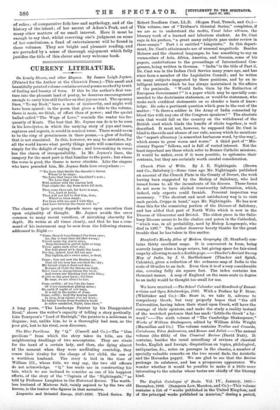CURRENT LITERATURE.
On Lonely Shores, and other Rhymes. By James Leigh Joynes. (Printed for the Author at the Chiswick Press.)—This small and beautifully printed volume contains several poems marked by truth of feeling and beauty of form. If this be the author's first ven- ture into the pleasant land of poetry, he deserves encouragement enough to carry him still further on that joyous road. The opening lines, "To my Book," have a note of insincerity, and might well have been spared ; in the poem that gives a title to the volume, there is more, we think, of effort than of power; and the quaint ballad called "The Wage of Love," reminds the reader too fre- quently of Keats. The best that Mr. Joynes can do is to be seen in his love-lyrics, in which the undying story of joys and tears, raptures and regrets, is retold in musical verse. There would se em to be the ring of genuineness in these poems,—a glow of feeling that is not simulated. In this, however, we may be mistaken, for all the world knows what pretty things poets will sometimes say, simply for the delight of saying them ; and love-making in verse has the charm of irresponsibility. In Mr. Joynes's lines, the imagery for the most part is that familiar to the poets ; but where the verse is good, the theme is never obsolete. Like the singers who have preceded him, Mr. Joynes finds love everywhere :—
" 'Tis Love that thrills the throstle's throat Whene'er he sings;
'Tie Love that tunes the blackbird's note ; 'Tis Love that wings With ardour wild the soaring lark That climbs the sky from dawn till dark.
Then come thou out, for Love is near, Yea, hard at hand; Thou wilt not fail to find him, dear, Where'er thou stand; For thou with me, and I with thee And Love between the twain will be."
The charm of lyric poetry depends more upon execution than upon originality of thought. Mr. Joynes avoids the error common to many recent versifiers, of mistaking obscurity for depth. He writes at all times clearly, and that he has a com- mand of his instrument may be seen from the following stanzas, addressed to Night :— "Come, though tear-dimmed thy dewy eyes; La, day is dead that did thee wrong; Unveil again thy starry skies,
Deep-drowned in garish light so long. Dnveii again each silver star, Nor fold about with clouds thy head ; For day, indeed, that did but mar Thy nightingale's sweet notes, is dead.
Come ; fear not now the flaming sun, That all too long has scorched the sky; His tyrant reign is dead and done ; Ilpsume of right thy throne on high. Bind, bind in orange-bloom thy brow. And crown our blushing love with bliss; 0 aive us thy good leave; till thou Be near, we are afraid to kiss.
Come swiftly ; all too late the lapse Of thine inconstant gliding moon; On earth if aught of evil haps, It is not in the nights of June.
Come, softly; hold thy healing hands In deep, deep silence o'er my brow ; No balmy breeze from Southern lands Is softer sandalled, Night, than thou."
A long poem, " The Landscape Painter by his Disappointed Rival," shows the writer's capacity of telling a story poetically. Like Tennyson's "Lord of Burleigh," the painter is a nobleman in disguise ; but, unlike him, he is a thoroughly bad man, as the poor girl, lost to his rival, soon discovers.


















































 Previous page
Previous page